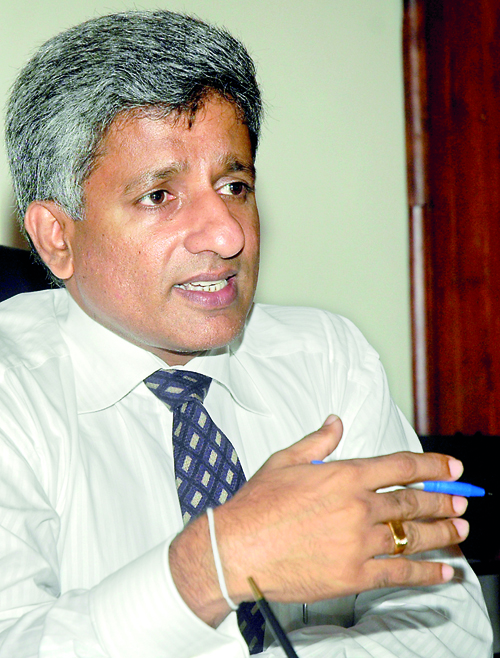Lanka can grow along with the ‘Big Three’ – Nishantha
View(s):This is a much discussed subject and various personalities who are involved with the game of cricket at various levels see it in a different manner; yet, in which way did the ‘Big Three’ ICC revamp affect Sri Lanka cricket? How would the Sri Lankan game survive in the cauldron of a cricket potpourri within the next Future Tours Programme (FTP)? These were some of the questions that bugged many like me in the recent past, because in cricket, a cricket administration survives from one FTP calendar to the other.
Remember, though tiny in size, Sri Lanka was one of the countries that stood up against the ‘Big Three’ move initially along with Pakistan and South Africa and were even bugged as the ‘Small Three’ when the fight was on. Sri Lanka stood by its stance to the wire and the one which caved in was South Africa — that too at the eleventh hour.
The Sunday Times Musings wanted to see the light through the man who was right at the centre from the very beginning of the controversy and now during the period of consensus at the Melbourne meeting. He is Sri Lanka Cricket (SLC) secretary Nishantha Ranatunga.
First we asked him what made the SLC take the opposition bench initially, instead of running with the wind. Ranatunga replied: “It was a case of principal. The ICC was run by ten senior members and the reins were shared equally. When the ‘Big Three’ concept was first mooted, there were some clauses which we could not agree upon. It was only the ‘Big Three’ who would have the governing chair and all the top seats in the sub-committees that matter. Besides, there was this relegation clause which hung over our heads with the exclusion of the “Big Three”. We were against these moves on principal.”
The Lankan cricket board secretary then explained how the rigid clauses changed one by one when the discussions in earnest were on. “The scenario had become more tolerable when we changed our stance on the issue”.
Then we inquired on how Sri Lanka Cricket would stand to gain during this FTP – which runs from 2015 to 2023 — and what benefits Sri Lanka managed to salvage during the Melbourne meeting. Ranatunga explained: “Just look at our FTP. It is a healthy one. During this FTP calendar we have managed some good tours which include something like three series against India, three against England and three against Australia. In short every year there will be at least one series against one of the three Big teams where Sri Lanka could gain monetarily”.
 The SLC secretary added: “We are not against the three countries concerned making more money. For instance, India brings in the money to the cricket coffers as a result of its billion plus population. At the same time in comparison to Sri Lanka, their infrastructure development also would cost them a colossal amount to sustain. In England and Australia, there are fans who come over to the venues paying good money like 60-80 pounds a day to watch the matches. There the cricket is in a very healthy state. So for countries like Sri Lanka to sustain the sport, cricket in those countries will have to be more than healthy – administration and money-wise.
The SLC secretary added: “We are not against the three countries concerned making more money. For instance, India brings in the money to the cricket coffers as a result of its billion plus population. At the same time in comparison to Sri Lanka, their infrastructure development also would cost them a colossal amount to sustain. In England and Australia, there are fans who come over to the venues paying good money like 60-80 pounds a day to watch the matches. There the cricket is in a very healthy state. So for countries like Sri Lanka to sustain the sport, cricket in those countries will have to be more than healthy – administration and money-wise.
“Our plight here is even if we open the gates free, people do not come over to watch the games most of the time. Therefore hosting a cricket match becomes a burden to the administration, because the same basic needs have to be looked into.”
Ranatunga said that among the ICC Test members, New Zealand, the West Indies and Sri Lanka have small populations. Yet, out of the three Sri Lanka has the lowest per capita income. “In this scenario, to sustain the game of cricket as a corporate sport is a huge challenge,” he stressed.
Then the Musings inquired if the SLC was of the view that it is better off financially under this new look ICC and if so what are its financial gains.
As if he was waiting for this question to come up, Ranatunga dived into his answer. “The present formula of the FTP benefits us. I think the SLC, or to be more precise, Sri Lanka as a whole has gained. During the last Future Tours Programme, Sri Lanka cricket’s income stood at about US$. 45 million. But our anticipated income for this FTP stands at around US$ 95-100 million. This means our cricket will be in a stronger position.
“However it is up to us to manage this income in a sustainable manner. If we try to do the very same mistakes that we did in the past, we may not be able to sustain.”
The SLC secretary explained that they are developing the game both nationally and internationally. He said internationally, the junior teams like the ‘A’ team and the development teams are organising ambitious FTPs of their own. Then in the domestic aspect, the sustenance of the game through the forward thinking coaching programmes like developing the game at under 15, 17 and 19 levels and the infrastructure development of top level cricket to lessen the gap between the international levels and the local levels would take pride of place.
Finally the musings inquired whether Sri Lanka Cricket could shed all its past bad debts and turn a new leaf with this improvement in the financial status. To this Ranatunga said: “Anywhere in the corporate world companies run with debts. Companies take loans for their activities. That does not mean that they are in the red. Even at present we have launched a club development programme which is going to cost Sri Lanka cricket some millions. But, these are futuristic programmes which are meant to sustain and develop the game in the country. So, even with the income turning to the better the financial intake and outflow will take its own course – but always to the betterment of the game.
“Now the local cricket is in safe hands for the next ten years with this FTP. The challenge that is in our hand is to harness fresh talent and develop the game in the country so that we could be a force to be reckoned with in the International arena,”the SLC secretary said in conclusion.


